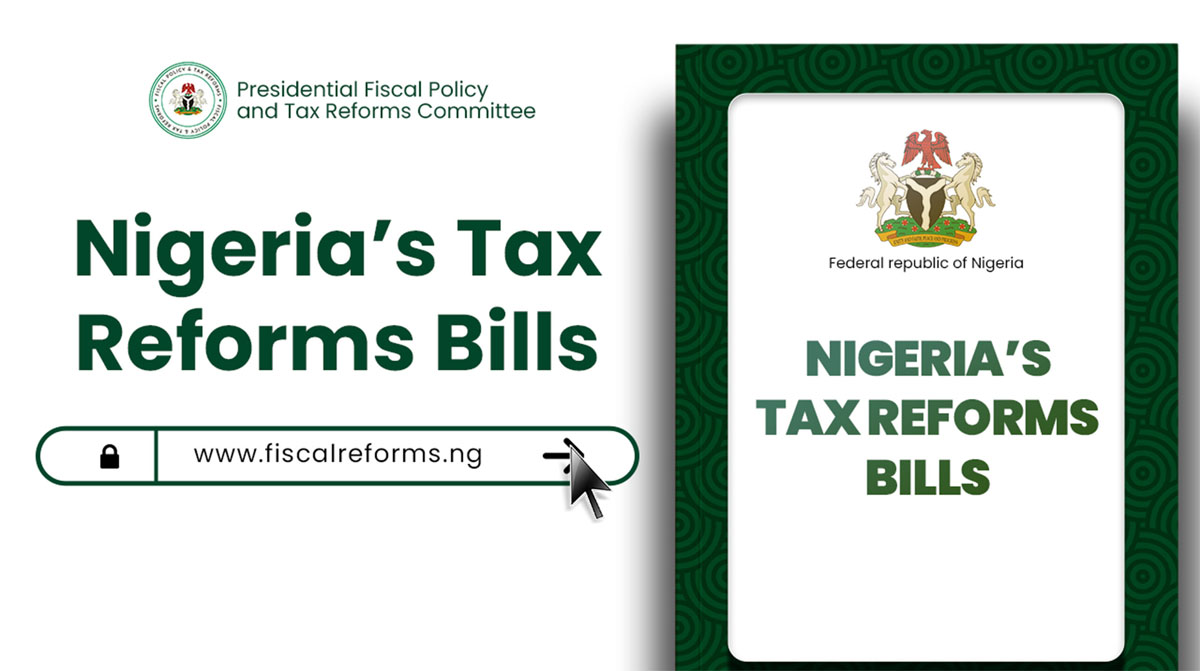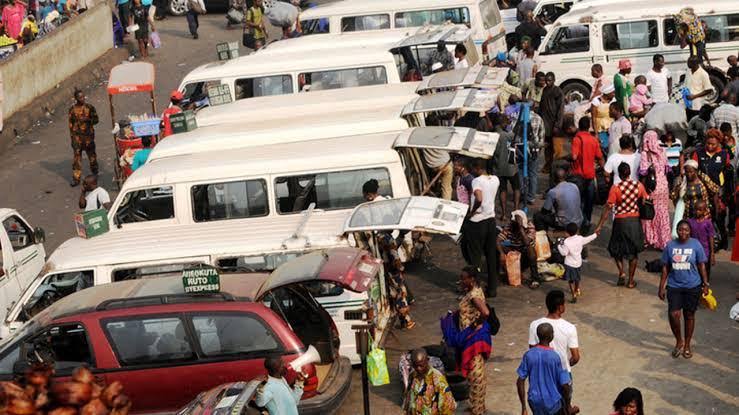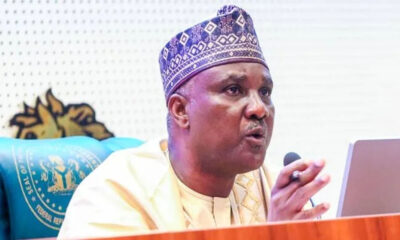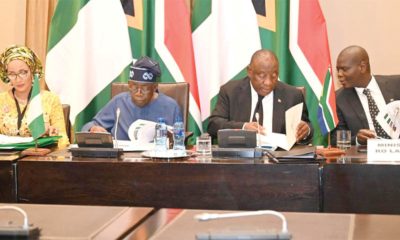metro
EXPLAINED: Proposed tax bills, what they would mean for Nigerians

EXPLAINED: Proposed tax bills, what they would mean for Nigerians
In August 2023, President Bola Ahmed Tinubu inaugurated the Presidential Committee on Fiscal Policy and Tax Reforms in Abuja. As nominally suggested, the committee has been working on reforming how taxes are administered, charged and remitted in Nigeria.
This committee’s activities have culminated in the proposal of the Tax Reform Bills which have caused a stir within policy circles and public debates in Nigeria. The bills include the Nigeria Tax Bill, Nigeria Tax Administration Bill, Nigeria Revenue Service (Establishment) Bill, and Joint Revenue Board (Establishment) Bill.
In the following paragraphs, FIJ simplifies the key aspects of the bills that have become major talking points.
VAT REVENUE SHARING
The topic of Value Added Tax (VAT) in the proposed Tax Reform Bills is a major talking point. VAT is an extra fee paid whenever one buys an item, a small slice added to the price that goes to the government to fund public services.
In Section 40 of the current VAT law in Nigeria, the government takes everything collected and splits it into three big pots. If N1,000,000 is collected in a year, N150,000 goes straight to the Federal Government (15%) and N350,000 (35%) is shared among the 774 local governments. The remaining N500,000 (50%) is shared among the states.
But here is where it gets interesting. The N500,000 is not split among states randomly. Half of it — N250,000 — is shared equally among all 36 states. So, every state gets about N6,944 regardless of how economically viable or large they are.
N150,000 (30%) is shared with the states based on their population. The states with larger populations get a larger cut of this N150,000. The last N100,000 goes to states based on derivation, a fancy word that means “Who brought in the money?” States that generate more VAT get a bigger portion of the amount.
READ ALSO:
- 12 feared dead in Zamfara community bomb explosion
- BREAKING: Senate forms special committee to address tax reform bill concerns
- Manchester United ‘scrap plans to wear LGBT rainbow jacket after devout Muslim player Noussair Mazraoui refused to wear it’
In the proposed tax reform bill, however, FG gets N100,000 (10%) and states have N550,000 (55%) to share. Most importantly, the derivation pot in the proposed reform is bigger. N330,000 (60%) out of the N550,000 will be shared with the 36 states based on how much VAT they generate.
On the more individual level, the current tax system only shares a 7.5% VAT on the goods and services Nigerians use. In the proposed bill, VAT charged on goods and services will go up from 7.5% to 10% first and then progressively to 15% by 2030.
In short, Nigerians will pay more VAT, and it will increase as the years go by.
However, core services such as rent, (public) transportation, health, food and education are exempted from VAT.
PERSONAL INCOME TAX CHANGES
Under the current tax system in Nigeria, people earning less than N300,000 annually don’t pay any tax. Those earning exactly N300,000 are taxed at 7% of their earnings, which amounts to N21,000. For individuals who earn between N300,000 and N600,000, the first N300,000 is taxed at 7% (N21,000), while the next N300,000 is taxed at 11% (N33,000), bringing the total tax to N54,000.
For incomes between N600,000 and N1.1 million, the first N600,000 is taxed as explained (N54,000), and the next N500,000 is taxed at 15%, adding another N75,000. This means you’ll pay a total of N129,000.
Those earning between N1.1 million and N2.7 million pay N129,000 on the first N1.1 million and 21% (N336,000) on the next N1.6 million, which brings their total tax to N465,000. For the people who earn more than N3.2 million, the first N3.2 million is taxed at N465,000, and anything above that is taxed at 24%.
Under the proposed reforms, the tax brackets change significantly. People earning up to N800,000 annually won’t pay any tax at all. For those earning between N800,000 and N3 million, the first N800,000 remains tax-free, while the next N2.2 million is taxed at 15%, amounting to N330,000.
For incomes between N3 million and N12 million, the first N3 million is taxed at N330,000, and the next N9 million is taxed at 18%, which adds N1,620,000, making the total tax N1,950,000.
READ ALSO:
- Lagos govt shuts supermarket accused of selling expired products
- Queen Dami to Portable: I’m only with you for money, will leave if you take new wife [VIDEO]
- Hookups lead to ritual killings, missing girls in Nigeria – Police
For those who earn between N12 million and N25 million, the first N12 million is taxed at N1,950,000, and the next N13 million is taxed at 21%, adding N2,730,000 and bringing the total tax to N4,680,000.
For those earning between N25 million and N50 million, the first N25 million is taxed at N4,680,000, and the next N25 million is taxed at 23%, adding N5,750,000 and bringing the total to N10,430,000. Finally, anyone earning above N50 million pays N10,430,000 on the first N50 million and 25% on anything above that.
Essentially, anyone earning below a million naira a year would not pay taxes under this structure. Also, those who earn a higher income will pay more.
CORPORATE INCOME TAXES CHANGES IN THE BILL
Under the current tax system, companies in Nigeria pay different rates of Corporate Income Tax (CIT) based on their size. Small companies with a total revenue of N25 million or less don’t pay any taxes.
Medium companies, earning between N25 million and N100 million, pay 20% (between N5 million and N20 million). Large companies, making over N100 million, pay the highest rate of 30%. For example, if a company makes N200 million in profits, it owes N60 million in taxes under the current rules.
The proposed reforms simplify this system and reduce rates for many companies. Small companies still won’t pay any taxes, but medium and large companies will pay the same rate.
In 2025, the rate will be 27.5% for both medium companies and larger ones. This will drop to 25% from 2026 onward. That same company making N200 million would pay N55 million in 2025 and N50 million in 2026.
READ ALSO:
- Court orders remand of Farotimi, Atiku says detention to intimidate citizens
- N80bn fraud: Court orders ex-AMCON MD Ahmed Kuru’s arrest
- FCT police impound 296 vehicles with tinted glass, defaced number plates
There’s also a new rule in the proposal to make sure big companies don’t get away with paying too little tax. If a company’s effective tax rate (what it actually pays after deductions) is less than 15%, it will have to pay extra to meet that minimum.
For instance, if such a company earns N20 billion and calculates its taxes at 12%, it would owe N2.4 billion. Under the new rule, it must add N600 million to meet the 15% minimum, bringing its total tax to N3 billion.
SCRAPPING FIRS AND UNIFYING TAXATION
The Nigeria Revenue Service Bill, proposed by the Presidential Tax Reform Committee, proposes replacing the Federal Inland Revenue Service (FIRS) with a new body called the Nigeria Revenue Service (NRS). In simple terms, the NRS will take over from FIRS but with more responsibilities.
One major change is the plan to centralise tax collection. Currently, some taxes are paid to state and local government agencies, but the NRS will handle all tax collection. It will also assist states and local governments in collecting their taxes and ensuring the funds are properly sent to them.
The bill also aims to simplify Nigeria’s complex tax laws. At the moment, taxes are governed by multiple acts, such as the Company Income Tax Act, VAT Act, and Petroleum Profits Tax Act. The proposed law will merge these into a single act, making taxes easier to understand and manage.
Businesses will no longer have to deal with different agencies for different taxes. Instead, the NRS will handle everything in one place, reducing any existing confusion for taxpayers.
The reforms also promise to introduce new tools to make the tax system fairer and more efficient. A Tax Appeal Tribunal will be set up to resolve disputes quickly and without the need for regular courts.
Meanwhile, a Tax Ombudsman will step in when taxpayers face issues like delays, errors or poor service. This office will investigate complaints and recommend solutions to ensure everyone is treated fairly.
READ ALSO:
- How mother of late Dowen College student, Sylvester Oromoni, died, family, others mourn
- Gunmen kill pastor going for burial, kidnap 3 others in Kogi
- Sheikh Gumi supports Tinubu’s tax reform bills, gives reasons
If the bill becomes law, the Joint Revenue Board will also be established to coordinate tax matters across all levels of government. Altogether, these changes promise a simpler, more streamlined tax system for businesses and individuals alike.
WHAT ARE DEVELOPMENT LEVIES AND WHAT HAPPENS TO THEM
The remittance of development levies is one of the major talking points in the Tax reform bill.
Critics like Borno State Governor Babagana Zulum have called the Federal Government out, for ‘planning to merge or scrap’ agencies like the National Information Technology Development Agency (NITDA), the National Agency for Science and Engineering Infrastructure (NASENI), and the Tertiary Education Trust Fund (TET Fund).
Under the current system, Nigerian companies are mandated to pay certain levies to these agencies. Legislations like the NITDA Act, the Finance Act and the TETFUND Act, enforce these levies.
In that system, firms 3% of the assessable profit for each year of assessment to fund education in Nigeria through TEFUND. Companies earning N100 million or more annually also contribute 1% of their pre-tax profits to the National Information Technology Development Fund to boost IT innovation.
Additionally, some industries, such as banking and telecommunications, would pay a newer 0.25% levy to fund science and engineering projects through NASENI.
The proposed bill simplifies this structure with just one development levy. Medium and large companies will contribute, but small businesses and foreign companies are exempt. From 2025 to 2026, the companies pay 4% of profits. This covers remittances to education, science and research, and innovation funds.
The levy drops to 3% between 2027 and 2029, and stays at 2% from 2030 onward. The collected funds will be split among key agencies if the new bill becomes law.
In the first year post-signing (2025-2026), The TET Fund gets the lion’s share — 50%. This share of the development levy will increase to nearly 67% by 2027. But after 2029, the TETFUND will phase out.
A new Student Education Loan Fund starts smaller at 25% in 2025–2026, grows to 33% in 2027, and takes over the entire levy by 2030. After 2026, funding for tech, innovation and engineering will stop.
EXPLAINED: Proposed tax bills, what they would mean for Nigerians
FIJ
metro
Yuletide: Travellers want fare discount for road trips

Yuletide: Travellers want fare discount for road trips
- Bemoan high fares
Passengers travelling to their country homes for the Christmas and new year day celebrations have urged the Federal Government to extend the free rail services announced early in the week to road transport routes across the country.
Some of the travellers who complained about the high fares called on the Federal Government to restore the 50 percent fare reduction on inter-state luxury bus routes granted to road passengers at this time last year.
The passengers who spoke at various terminals and loading stations of long distance road transport companies in Lagos, were reacting to the upsurge in fares to about N40,000 on luxury buses and N65,000 on mini buses going to the South-East.
Reports from some of the boarding stations revealed that upon hearing the announcement of free train ride, some passengers thronged the loading stations at various points in Lagos to benefit from the gesture, but were disappointed when they were informed that the offer did not cover road transport.
At Terminal 1 in Oshodi, Alafia, Jibowu, Mazamaza, and private stations in the Cele/Ejigbo axis, on Saturday, passengers bemoaned the high cost of travelling on both the big and small buses, disclosing that many people were not travelling because they couldn’t afford “the exorbitant fares the transport firms are collecting.”
Interestingly, a trip on board Toyota Sienna which used to attract slightly higher fare than on a typical mini bus, is the same at N40,500.
One of the passengers told our reporter one if the stations in Cele, “You press people should please tell (President Bola) Tinubu that poor masses cannot afford to go home this Christmas because there is no money in the country.
“(President) Tinubu should please repeat the 50 percent discount on long distance fares which some of us enjoyed last year to travel home.”
At the nearby Young Young Shall Grow station, a passenger who planned to travel to the east recalled how he took advantage of the 50 percent fare discount to travel from Abuja to Onitsha and back in 2023, and wondered why the Federal Government has not considered the re-introduction of the palliative this festive season.
According to the man who gave his name as Chinedu Uzoechina, his intention to travel to Anambra state and back with his wife and five children, has been stalled by the high transport fares being charged at the various terminals.
Uzoechina, who came to book for seats in advance, lamented, “I was hoping that the 50 percent fare discount that followed the increase in fuel pump price would be available this year, but that has not been the case this year. Forty thousand into seven is N280,000 for one-way luxury tickets.
“If you add the cost of coming back, it means I will spend nothing less than N560,000 on transportation alone for seven of us. Where will I get that kind of money? I have called my wife to inform her of the situation here (at the terminals in Cele).
“She is not happy that we are not travelling anymore, but what can I do?”
According to him, the only thing that can make his family travel again is if the Federal Government extends the free train ride offer to long distance road transport routes, like Lagos-east, or reduces the fares in collaboration with the operators.
Like Uzoechina, many other intending travellers were still hopeful that the government wiuld still intervene with a fare discount, even as they disclosed that they would either cancel the trips outrightly or reduce the number of tickets to be bought, if their hopes are dashed.It was learnt that the fares were slightly lower by about N2,000 at Terminal 1 where both big and mini buses have been loading for day and night trips at Oshodi.
Reacting to the passengers’ complaints about high fares at the terminal owned by the Lagos State Government, Damian Ezuma, the manager of Izu Chukwu Transport, blamed the situation on the rising cost of maintaining the buses as well as on the pump price of diesel, which he said, is as high as N2,000 a litre in some parts of the country.
“It is not our fault. The cost of maintenance is so high that it is only by the grace of God that some of transport companies still manage to keep their buses on the road these days. Do you know that one big bus tyre costs between N250,000 and N500,000, depending on the quality and brand?” Ezuma argued.
He confirmed that many intending travellers who heard about the free train services offer by the Federal Government have been coming to the terminal make enquiries on whether long distance-plying buses are part of the gesture and whether last season’s fare discount applies this year.
Many of them leave the terminal disappointed and deciding not to travel anymore, but opting instead to wait for a possible fare palliative from the government.
Also commenting on the reason for the high fares, a manager at Chisco Transport’s head office in Lagos explained that the unfavourable naira-dollar exchange rate has impacted on the prices of replacement parts and maintenance costs generally.
But a major factor is the fact that during the peak festive season, buses are usually full when leaving major cities like Lagos and Abuja, but are almost empty in their return journeys.
So some operators slightly adjust their fares upward to cover the losses incurred during return trips.
In 2023, the special fare discount by government through the luxury bus owners took effect on December 21, and lasted till the second week of January, 2024.
metro
Navy arrests 19 Nigerians attempting to reach Europe by hiding on ship

Navy arrests 19 Nigerians attempting to reach Europe by hiding on ship
The Nigerian Navy Ship (NNS) BEECROFT has successfully apprehended 19 individuals attempting to stow away on Europe-bound vessels.
In a statement issued on Saturday in Lagos, the ship’s Information Officer, Lt. Hussaini Ibrahim, disclosed that 15 stowaways were intercepted on Dec. 19 aboard the European-bound Moto Tanker (MT) KRITI RUBY. Another four were caught on Dec. 21 aboard MT MCC YANBU.
“Preliminary investigation revealed that the stowaways boarded the vessels at night and concealed themselves in the rudder compartment while attempting to illegally migrate to Europe,” Ibrahim stated.
The Navy’s Quick Response Team (QRT), operating from ATLAS COVE and using the Falcon Eye Alignment under the Nigerian Navy Maritime Domain Awareness Facility, facilitated the interception of the 15 individuals near the Lagos fairway buoy.
READ ALSO:
- Troops arrest four Ambazonian rebels in Taraba
- NIMC warns against extortion, reaffirms free NIN enrollment
- NNPC denies claim of Port Harcourt refinery shutdown
Ibrahim further explained that credible intelligence led to the interception of the additional four stowaways by Navy personnel deployed on escort duties aboard the vessel.
“The prompt response of the QRT saved the stowaways from exposure to life-threatening situations during the long voyage,” he added.
The first group of 15 individuals has been handed over to the Nigeria Immigration Service, Lagos State Port/Marine Command, Apapa, for further investigation and necessary action. The remaining four suspects will also be transferred in due course.
“The presence of stowaways poses serious security threats to maritime operations, including risks of smuggling, piracy, drug and human trafficking, among other maritime crimes,” Ibrahim noted.
He emphasized that under the leadership of Chief of Naval Staff Vice Adm. Emmanuel Ogalla, NNS BEECROFT will continue maintaining security along Lagos waterways and surrounding creeks to support safe maritime activities and economic growth.
Navy arrests 19 Nigerians attempting to reach Europe by hiding on ship
metro
Troops arrest four Ambazonian rebels in Taraba

Troops arrest four Ambazonian rebels in Taraba
Troops of the 6 Brigade Nigerian Army/Sector 3 of the Operation Whirl Stroke (OPWS), have arrested four suspected members of Ambazonian rebels in Taraba.
The News Agency of Nigeria (NAN) reports that Ambazonia is a rebel group operating in neighbouring Cameroon Republic.
A statement on Saturday in Jalingo by Capt. Olubodunde Oni, Acting Assistant Director Army Public Relations, said the suspects were arrested at a hotel in Takum town.
The statement said that acting on credible intelligence, the suspects were tracked and apprehended.
According to the statement, during initial interrogation, the suspects confessed to being part of the rebel group involved in arms proliferation in exchange for cocoa with their Nigerian collaborators.
It said that four mobile handsets were recovered from the suspects now in detention undergoing further investigation.
READ ALSO:
- NIMC warns against extortion, reaffirms free NIN enrollment
- NNPC denies claim of Port Harcourt refinery shutdown
- Like Ibadan, stampede claim 10 lives for Abuja Catholic church, 17 in Anambra
The statement also said that in another operation following actionable intelligence, troops deployed at Natilde community in Bantaji District of Wukari Local Government Area intercepted a truck with registration number WKR 66 BB, transporting 19 pieces of stolen pipelines belonging to the Nigerian National Petroleum Corporation Limited (NNPCL).
It said that further collaborative efforts with the Nigeria Security and Civil Defence Corps (NSCDC) in Wukari Division led to the recovery of an additional 11 pipes, bringing the total to 30.
“The recovered items have been handed over to the NSCDC Wukari Division for further investigation and necessary action.
“The 6 Brigade Nigerian Army will remain resolute in its commitment to safeguarding lives and property while ensuring the security of critical national infrastructure.
“We urge members of the public to continue providing timely and credible information to security agencies to enhance our collective efforts in maintaining peace and security,” the statement added.
Troops arrest four Ambazonian rebels in Taraba
(NAN)
-

 Railway10 hours ago
Railway10 hours agoLagos Rail Mass Transit part of FG free train ride – NRC
-

 metro1 day ago
metro1 day agoCourt stops customs from seizing imported rice in open market
-

 metro2 days ago
metro2 days agoFG transfers electricity market regulatory oversight in Lagos to LASERC
-

 metro2 days ago
metro2 days agoAfe Babalola: Court grants Dele Farotimi bail, barred from media interviews
-

 metro2 days ago
metro2 days agoIbadan stampede: Tinubu orders probe as death toll hits 40
-

 News2 days ago
News2 days agoAdebayo Ogunlesi, 2 other Nigerians make Forbes 50 wealthiest Black Americans list 2024
-

 metro3 days ago
metro3 days agoAbuja demolition: Soldiers attack FCTA officials, seize vehicles
-

 metro20 hours ago
metro20 hours agoIbadan stampede: Ooni reacts after arrest of ex-wife













